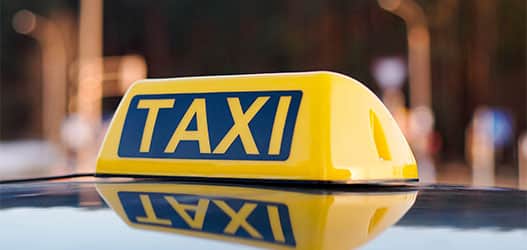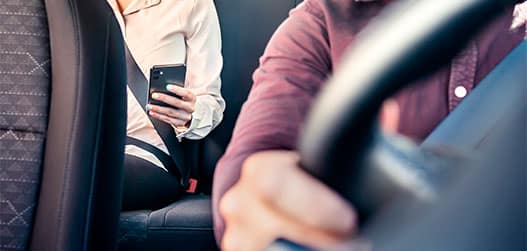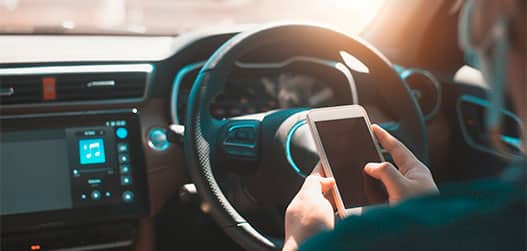Las Vegas’ Best-Rated Lawyers For Uber & Ridesharing Accidents
Have You Been Injured in an Uber Car Crash?
Here are the Steps to Take:
If you or a loved one have been in an accident due to an Uber or Lyft accident, contact the Las Vegas Ride Sharing Accident Attorneys at Benson & Bingham to get the compensation you deserve. Drivers of Uber, Lyft, and other ride-sharing companies are regulated in Nevada under the PUC (Public Utilities Commission) and not governed under the NTA (Nevada Transportation Authority) similar to taxicabs, limousines, and other commercial carriers. Nevada Law mandates that such companies operate with a minimum of $1.5 million in liability coverage for personal injury or death in a motor vehicle accident. If you are pursuing a personal injury case in Downtown Vegas, our experienced attorneys can provide the expert guidance you need.
Screening for drivers of Uber and Lyft are done by the respective companies who drive their own vehicles for a fee. The popularity of the service has grown by leaps and bounds as the prices often undercut the competition and afford passengers a viable option, especially in under served residential neighborhoods where taxicabs are often not present.
Seek Immediate Medical Assistance after the Traffic Accident
If you are physically able to do so, check on the health and wellbeing of the other parties in the accident. Immediately call 911 so that your injuries can be examined and you can begin to receive treatment. This information will be helpful for your attorney.
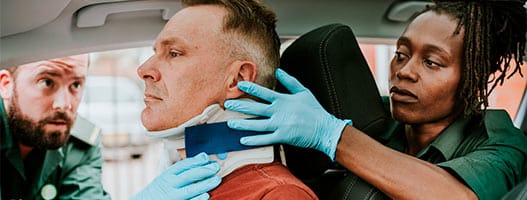
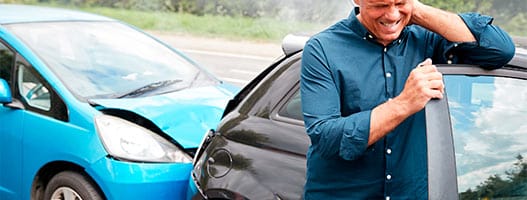
Inform Uber or the Rideshare Service about the Accident
As soon as possible, contact Uber through the app or by phone to inform them about the accident. Include basic details about what happened. Contact law enforcement as required by Nevada law so that they can investigate and file a police report.
Document the Scene of the Accident & Get Everyone’s Contact Information
Pictures of the accident scene provide compelling evidence for your insurance and personal injury claims. Include details of your injuries and the involved vehicles. Obtain the contact information of the other parties and any witnesses who observed the accident.


Schedule a Free Consultation with our Ride Sharing Accident Lawyers
Before you talk to any insurance companies, call Benson & Bingham Accident Injury Lawyers, LLC, to schedule your free consultation. We will help you explore your legal options and explain how we can maximize financial compensation for your damages.
Investigation of Liability & Medical Records
Your Las Vegas Uber accident attorney will investigate the evidence to determine who was liable for the collision. Your medical records, expert testimony, and many other types of evidence will be used to build a personal injury claim on your behalf.


Mediate & Negotiate to Resolve the Personal Injury Dispute
Most personal injury claims are resolved out of court in mediation, which is why it’s imperative to work with a Las Vegas ridesharing lawyer who is an expert at negotiation. We will fight for a full, fair settlement on your behalf that considers all of your injuries and damages.
Consult with our Attorneys for a Free Case Evaluation
Why Hire Our Top-Rated Las Vegas Uber & Rideshare Accident Law Firm
Legal Representation for Ride Sharing Accident Injury Claims in Las Vegas
No matter what injuries you’re facing after an accident with an Uber, you need representation from a trusted Las Vegas ridesharing accident lawyer. At Benson & Bingham Accident Injury Lawyers, LLC, we are dedicated to providing the highest quality, personalized legal approach for each client we serve. We are an award-winning law firm who has developed a reputation for success. Call us today to schedule your obligation-free, confidential consultation with one of our experienced personal injury attorneys!
Types of Damages in Las Vegas Uber & Rideshare Accident Lawsuits
Our Las Vegas Attorneys Will Help You Obtain Compensation for the Following:
Lost Wages & Loss of Future Income
People who are facing severe injuries must take time off work to recover. Your settlement should include all of your lost wages as well as your reduced earning capacity if your injuries affect your ability to continue working.
Current & Future Medical Bills
All of your medical expenses related to your accident, including ambulance transportation, emergency care, imaging, surgeries, medications, equipment, therapy, rehab, and future expenses should be covered by your settlement.
Physical Pain & Suffering
Injuries from ridesharing accidents in Las Vegas can result in acute or chronic pain, as well as suffering and decreased quality of life. Your Reno ridesharing accident attorney will include these calculations into your personal injury claim.
Emotional Distress & Trauma
Ridesharing accidents can cause a great deal of emotional distress, trauma, and PTSD. Our Reno Uber accident attorneys will work you each step of the way to maximize your compensation for the damages that you’ve suffered from your accident.
Loss of Companionship & Consortium
When accidents are fatal, family members may suffer from loss of companionship or loss of consortium with a spouse. Although it can be difficult to place a financial value on these painful losses, we will fight for a fair settlement on your behalf.
Meet Our Skilled Team of Lawyers
Benson & Bingham Accident Injury Lawyers, LLC, is proud to be a leading personal injury law firm in Las Vegas. Our name partners, Mr. Joseph L. Benson II and Mr. Ben J. Bingham, and our associates are award-winning attorneys with extensive experience handling all types of car accident claims.
We make it our mission to provide truly personalized service to each of our clients and believe that you will notice the difference! We strive for excellence in all areas of our legal practice. Call our firm today to schedule your free consultation. We are eager to meet you and discuss your legal options.
Meet the Attorneys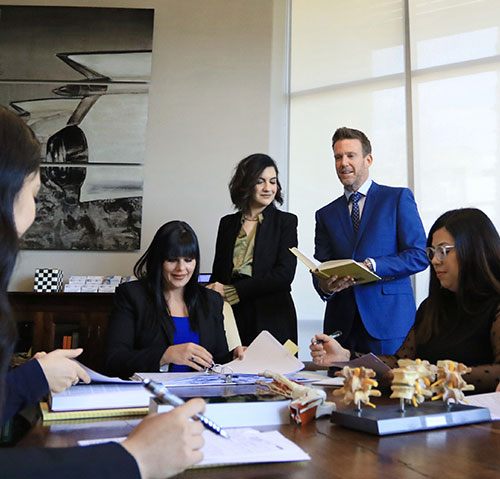
Client Testimonials
Las Vegas’ Most Reliable Personal Injury Lawyers
I suggest using Benson & Bingham if you’re in need of an injury accident attorney! They have an amazing staff and made the entire process easy and stress free handling my case with compassion and a remedy of great efficacy!
I picked this place and I’m so glad that I did. Ida was very helpful and professional. If I had questions they were answered. I would definitely use them again in the future and I would definitely recommend them to anyone. Thank you for your service I appreciate it.
What I love about Benson & Bingham, especially from my attorney, Lina, I felt informed and cared for my health. She made sure I was ok at all times through my injury. I hate I had the accident, but it was comforting to know I was well taken care of.
Read More Reviews
Award-Winning Rideshare Accident Injury Law Firm In Las Vegas
Recent Settlements & Victories

Total Settled by Verdicts for Clients

Since 2004, the award-winning attorneys at Benson & Bingham have secured over $500 million in compensation for our clients who have been injured because of someone else’s recklessness or negligence.
Rear-End Taxi Accident

Although we work with most personal injury claims, we specialize in car accident claims. Our firm was recently able to win nearly $2 million for a client who had been in a rear-end taxi accident.
Intersection Accident with an Uber

Clients seek our services for all types of car accident claims. We have won as much as $1 million for an Uber accident that took place in an intersection in Nevada.
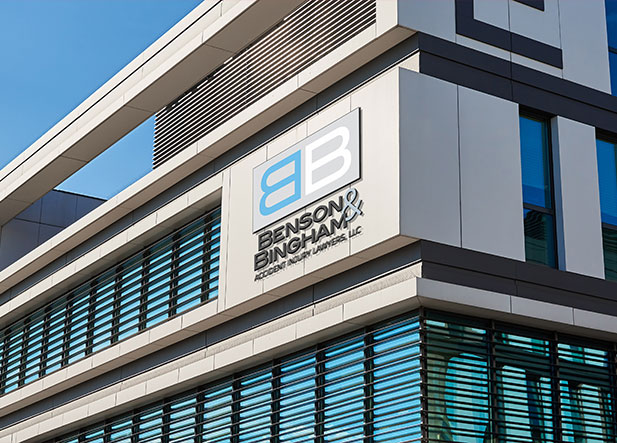
Visit Our Law Office in Las Vegas

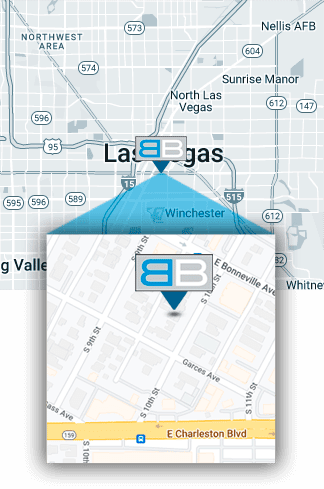
Las Vegas, NV 89101
Our personal injury law firm is conveniently located in downtown Las Vegas. Call our award-winning lawyers to schedule your free, confidential consultation where we can discuss your legal options and ensure justice is done!
Insurance Coverage for Uber & Rideshare Accidents Depends on the Ride’s Status
The Uber App is Open and the Driver is Waiting for a Rideshare Request
When an Uber driver is on the app and actively waiting for a rideshare request, the driver’s auto insurance company is liable for the primary coverage if there is an accident. Uber’s contingent liability insurance will cover damage that is beyond the driver’s personal policy limit.
The Uber or Rideshare App is On & the Driver Accepts a Ride Request
Once a driver has accepted a ride request, Uber’s commercial liability policy becomes primarily liable for damages in the event of an accident. This coverage ends once all passengers have exited the vehicle and the trip has been marked as ended in the Uber app. Victims may pursue damages from Uber, the driver, or their own insurance as well.
The Rideshare App is Off and the Driver isn’t Carrying any Passengers
In these cases, the driver’s personal auto insurance company is responsible for paying for damages if the driver or vehicle is involved in an accident. The case would be pursued like any other personal injury claim with a private vehicle because the Uber driver is not actively working or seeking ridesharing passengers.
Were You Injured in an Uber Accident?
Call Our Lawyers Today for a Free Consultation
Types of Injuries in Uber & Ridesharing Accidents
Broken Bones
Fractures in the back, hips, pelvis, legs, arms, ribs, and shoulders can occur after a car accident. These injuries can require months of rehab and treatment for a full recovery.
Lacerations & Abrasions
Severe cuts that leave scars, bruising, burns, and road rash are common injuries after ridesharing accidents in Nevada. You may be able to pursue damages for disfigurement.
Loss of Limbs
Occasionally, severe car accidents can result in crush injuries or another reason for amputations. Your Las Vegas ridesharing accident lawyer may pursue damages for dismemberment or reduced quality of life.
Neck Injuries & Whiplash
Whiplash and similar neck injuries are among the most common ridesharing accident injuries and are caused by the sudden force of collisions with another vehicle. Victims may experience headaches and other symptoms.
Traumatic Brain Injuries
Concussions and other TBIs can be very serious and limit your ability to function normally, work, or care for your family. Full recovery may take months or longer, depending on the symptoms.
Spinal Cord Injuries
Damage to the spinal cord or nerves can cause reduced range of motion, inability to walk, organ dysfunction, chronic pain, tingling, and other symptoms that may be permanent.
Common Causes of Uber
& Ridesharing Accidents
Distracted Driving
Drivers who are distracted by their phones, the radio, other passengers, or their surroundings can cause serious accidents and may have reduced reaction time.
Drunk Driver
Driving under the influence of drugs or alcohol is not only a crime, but one of the leading causes of accidents in Nevada. Passengers may be seriously injured or killed.
Drivers Who Speed
Excessive speeds prevent drivers from being able to react appropriately to their environment and may cause fatal injuries to pedestrians, other drivers, and passengers.
Reckless/Aggressive Driving
Willfully disregarding the safety of others while driving is a common cause of ridesharing accidents in Nevada. Drivers may be intentionally aggressive, such as tailgating, or neglectful.
Falling Asleep While Driving
Driving while very tired can be as dangerous as driving drunk. Unfortunately, many people don’t realize the seriousness of driving while fatigued and cause major accidents.
Poor Weather Conditions
Limited visibility, anxiety, reduced reaction time, or poor handling of the vehicle due to road conditions and weather can also cause serious ridesharing accidents in Nevada.
Defective Car Parts
Some accidents occur because defective car parts prevented the vehicle from functioning properly. The manufacturer and/or mechanic may be held liable for damages.
Common Evidence Used in Las Vegas Uber Accident Cases
Proof of Injuries
Your medical records will provide crucial evidence in your personal injury case, including imaging reports, statements from your doctor, physical therapy records, and even expert testimony, in some cases.
Proof of Lost Wages
Documentation from your employer, such as pay stubs, will be used to demonstrate how much income you lost while your injuries forced you to stop working. Lost earning capacity may also be calculated.
Evidence from the Scene of the Accident
The police report, any pictures that were taken, and any traffic camera footage that can be recovered will be key evidence for your Las Vegas Uber accident lawyer and will help investigators determine liability.
Proof of Property Damage
Reports from your mechanic and insurance adjuster, along with photos and information regarding any other relevant property damage, will also be an important part of your personal injury case.
Additional Evidence
Phone records that prove distracted driving, police reports, witness testimony, expert testimony, dashcam footage, and other pieces of evidence will be uncovered by your Las Vegas ridesharing accident lawyer.
FAQs About Uber & Rideshare Accident Injury Claims
Rideshare services, like Uber, are quickly becoming the primary method of transportation in Las Vegas for visitors and workers alike, outshining taxi cab companies in recent years as passengers find Uber more affordable and even more convenient than hailing a taxi. However, the question comes up over and over again: What happens if your Uber driver gets into an accident while you are riding in the back seat? What if you are injured in this accident?
Read on for answers to the questions that we hear most frequently from our clients about Uber accidents in Las Vegas.
How Much Compensation Should I Receive after a Rideshare Accident?
How much compensation you receive will vary widely, depending on the insurance coverage that is available, what damages occurred, who was liable, whether you are determined to be partly at fault for the accident, the severity and extent of your injuries, and other factors. The Las Vegas Uber accident attorneys at Benson & Bingham have won as much as $2 million for victims of ridesharing accidents.
What Should I Do if the Uber Driver Left the Scene of the Accident?
Leaving the scene of an accident is a crime in Nevada. Try to get any photos or video evidence of the driver fleeing the scene and call 911 immediately to report the accident. Include as many details about the driver as possible. Gather contact information for any witnesses or other parties in the accident. Because ridesharing occurs through Uber and other corporations, it’s likely that the driver will be found and penalized for their actions.
Is Working With An Insurance Company the Right Choice after an Uber Accident?
Working with an insurance company is just one part of a personal injury lawsuit. Contact a trusted Las Vegas Uber accident attorney at Benson & Bingham as soon as possible to discuss the situation. We will guide you in conversations with the insurance company to help you avoid accidentally admitting fault for the accident. Our attorneys will represent you in negotiations to maximize your settlement.
What Compensation Can I Receive if I File a Lawsuit after a Rideshare Accident?
Compensation after any car accident will vary depending on the circumstances and your injuries, but can include all medical bills associated with the accident, including ongoing medical care needs; lost wages; reduced earning capacity, including anticipated promotions and bonuses, if your injuries prevent you from working as you were prior to the accident; pain and suffering; any ongoing care needs you have as a result of your injuries; emotional distress, trauma, and PTSD; reduced quality of life, wrongful death, and loss of companionship or loss of consortium. Our Las Vegas Uber car accident lawyer will uncover evidence to demonstrate your damages and promote maximum compensation on your behalf.
Can I Sue if a Family Member Died in a Las Vegas Uber or Ridesharing Accident?
If a close family member died in an accident that was the result of someone else’s negligence or recklessness, your Las Vegas wrongful death lawyer may be able to assist you with a wrongful death lawsuit. This is similar to other personal injury claims but is filed on behalf of the deceased’s personal representative or closest living family member. You may be able to collect damages for loss of consortium, loss of companionship, pain and suffering, emotional trauma, loss of income, and other losses, including your own personal injuries, if you were also in the accident.
How Can Lawyers Help Determine Liability in a Uber Accident Settlement?
Our Las Vegas Uber accident attorneys specialize in car accidents and have extensive experience uncovering evidence, building arguments, negotiating with insurance companies and corporations, and other essential skills that will increase the likelihood of your personal injury claim’s success. We use our comprehensive legal knowledge and understanding of the process to guide you through each step so that you can focus on recovering from your injuries and moving forward with your life.
Do Las Vegas Uber Drivers Need to Carry Special Insurance to Drive for Uber?
Uber drivers are required to carry insurance on their vehicles, which is legally mandated by the state. Drivers who register their vehicles in Nevada are required to have a minimum of $25,000 for bodily injury or the death of one person, and $50,000 for the bodily injury or death of two or more people in a single accident. Drivers are also required to have $20,000 in coverage for property damage liability.
When a driver is driving his or her vehicle for personal reasons, this insurance is available to cover damages caused. However, when a driver is en route to pick up a passenger or has a passenger in the car, his or her personal insurance may not cover the accident, as it occurred while the vehicle was being used for commercial purposes. Because of this, Uber provides an increased amount of insurance while an Uber driver has his or her app engaged or is in the process of transporting a passenger.
These amounts include:
- If the driver is online awaiting a ride request: $50,000 for bodily injury or death of one person, $100,000 in bodily injury coverage, as well as $25,000 for property damage liability per accident.
- If the driver is en route to pick up a passenger or is transporting a passenger: Uber provides a $1 million third-party liability policy as well as an uninsured/underinsured motorist bodily injury policy and comprehensive and collision insurance contingent on the driver maintaining a comprehensive and collision policy on his or her own insurance policy. Accessing Uber’s comprehensive and collision policy requires a $1,000 deductible paid for by the driver.
What Does Uber do to Ensure that its Drivers are Safe? How Does This Affect My Las Vegas Uber Accident Case?
Uber states in its policies that it conducts a background check on every driver before his or her first trip, and once a year after that. This check screens for driving violations, impaired driving, and violent crime. Additionally, the company states that it employs technology through its platform that can alert Uber if a driver has been charged with a criminal offense between annual screenings.
Because Uber classifies its workers as independent contractors instead of employees, the company is shielded from much of the liability resulting from the actions of its drivers. However, if there is evidence that Uber was negligent in its background screening, the company could potentially be liable for the accident that caused your injuries.
My Las Vegas Uber Driver Caused the Accident. Who is Liable—the Driver or Uber?
The driver is generally liable for injuries sustained by his or her passengers if the driver gets into an accident, but compensation will likely come from Uber’s insurance policy rather than from the driver’s policy.
What Should I Do if I Suspect My Uber Driver is Drunk?
According to Uber’s Zero Tolerance Policy, if you suspect that your driver is drunk, you should end the trip immediately, exit the vehicle, and call 911. You should also access your Uber app and provide feedback.
How Long Do I Have to File A Lawsuit Against the Las Vegas Uber Driver who Caused my Accident?
The statute of limitations to file a Nevada Uber accident lawsuit is two years from the date of the injury.
I Believe that my Las Vegas Uber Driver was using the Uber App while Driving. Can I Sue Uber for a Distracted Driving Accident?
While there is no doubt that the Uber app—which the driver must use and consult while driving—can be a distraction, there have been many lawsuits filed that alleged this very point. However, the lawsuits are not generally successful due to the driver’s status as an independent contractor and his or her choice to consult the app while in dangerous driving conditions. Generally, liability would remain with the driver in such a situation.
Are Uber or Rideshare Accidents Handled in the Same Way as Other Motor Vehicle Accidents?
Motor vehicle accidents involving Uber and Lyft drivers are handled no differently than any other accident case. Drivers are the primary defendant with the owner’s insurance policy being the first insurance used; with ride sharing companies the insurance policy of Uber or Lyft would be the primary by virtue of the new law and contractual agreements between the operators and the companies. Uber accidents will have the same kinds of causes of action in a lawsuit as any other taxi lawsuit: Negligence/Negligent operation, Negligence per se, Vicarious Liability, Respondeat Superior, and in some cases Negligent Hiring. The big distinction in a ride sharing company versus a taxi cab operation in Nevada is that taxi’s are owned by the taxi company; of the 14 or so licensed taxi cab operators, they received the bulk of the revenue for hauls with driver coming to work and driving the taxi’s vehicle. Uber drivers are the opposite: they own their vehicles and have private insurance on those, and when they are driving passengers for Uber or Lyft then the respective ride sharing companies’ insurance becomes primary
Benson & BinghamThe interesting issue is whether the ride sharing company can be sued as an “employer” in a typical lawsuit setting where respondeat superior is alleged, or in laymen’s terms, whether the employer is legally liable for the acts of its employees. Nevada subscribes to vicarious liability law; however, the issue becomes whether the ride sharing company is in fact the employer, or are they just a technology company offering the connection between the driver and the passenger? Another question is whether the payment relationship between Uber and Lyft and their drivers– is it such that Uber is paying the driver or is the driver paying Uber? The reasons such distinctions matter is that Uber may argue that they are not the employer, and the drivers are merely independent who drive when, where, and how long they want and merely pay Uber a transaction or commission on the fare. Thus, they are independent contractors offering rides from A to B.
These distinctions are important when a legal analysis is considered to hold Uber or Lyft legally liable for amounts over the $1,500,000.00 legal liability mandate. In the event of a wrongful death action or a serious injury accident case, $1.5M in liability coverage is not going to be enough to compensate injury victims. A lawsuit directly tying Uber or Lyft to the accident is crucial. Arguing the specific elements of respondeat superior and the theories of legal liability including whether the contractor is truly independent. Some of these issues may be statutory in nature. If you need legal advice concerning a ride sharing company like Uber or Lyft, contact Benson & Bingham who will educate and advise you on your personal injury and liability options.
Read More on Ride Sharing
Accidents Inside Our Personal Injury Blog
Blog
- As More Californians Move to Nevada, a Look on How Traffic Laws Differ
- Nevada Ranks First in America in Percentage of Pedestrian Crosswalk Deaths
- How To Document a Workers’ Comp Injury In Las Vegas
- How Does Product Liability Insurance Affect My Injury Claim Against a Company?
- What is the Best State to Drive In? (Hint – it’s not Nevada)
Contact Benson & Bingham
Accident Injury Lawyers For A Personalized Case Consultation
Let Benson & Bingham help you understand your legal options in Las Vegas. Even though the technology hasn’t been around for long, Benson & Bingham has helped hundreds of rideshare accident victims obtain just settlements or trial verdicts; contact us today for a free, no pressure case evaluation.





































